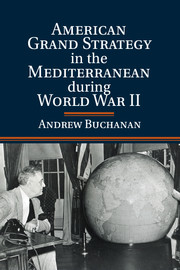'This book is a fine piece of research and analysis. Scholars of World War II, US diplomatic history, and twentieth-century international relations will all find much of value, and general readers and university students will also want to give close attention to Buchanan’s work. Buchanan does an excellent job of showing the importance of the Mediterranean military-diplomatic-economic theater as it developed from 1940 to the early Cold War. Through this, he has produced a major work of research and interpretation on a vitally important subject.'
David Mayers - Boston University
‘Among the many myths still alive from World War II is the belief that the Americans were reluctant participants in the Mediterranean war effort, pulled there by an ambitious Churchill. Andrew Buchanan demolishes that myth with a carefully constructed and convincing dissection of the American side of the story, to show that Roosevelt was happy to play a part in the Mediterranean because it would seal America's emergence post-war as the global successor to the collapsing British Empire. This is an original and path-breaking contribution to a subject long assumed to have been signed and sealed, and a challenge for historians to revisit other apparent certainties with the same critical acumen.’
Richard Overy
‘Andrew Buchanan's study transforms our understanding both of America's wartime strategy and of the war in the Mediterranean. This important book deserves widespread attention.’
Jeremy Black
‘In this fascinating and well-crafted study, Andrew Buchanan shows how the United States rose to become the predominant power in the Mediterranean region, and brings forward insights regarding the complex interconnections between the politics of liberation, American economic and cultural expansion, and Washington's strategic imperatives.’
Matthew Jones - author of Britain, the United States and the Mediterranean War, 1942–1944
‘American Grand Strategy in the Mediterranean during World War II makes an important contribution to the existing historiography of the war. Buchanan advocates for a new interpretation of the events. Suggesting that the Mediterranean was not a ‘peripheral’ theater for the United States, he argues convincingly that America was an active participant in the region; gradually assumed the lead role, forcing the British to take a back seat; and had substantive grand strategic interests in the Mediterranean. Buchanan’s book should appeal to a wide audience, including both interested lay readers and World War II scholars.’
Mary Kathryn Barbier
Source: H-Diplo
'A major and important reinterpretation of US policies and strategies in the Mediterranean during World War II.'
Mark Stoller - author of Allies and Adversaries: The Joint Chiefs of Staff, the Grand Alliance, and US Strategy in World War II
'American Grand Strategy in the Mediterranean during the Second World War makes an important contribution to the existing historiography of the war. Buchanan advocates for a new interpretation of the events. Suggesting that the Mediterranean was not a ‘peripheral’ theater for the United States, he argues convincingly that America was an active participant in the region; gradually assumed the lead role, forcing the British to take a back seat; and had substantive grand strategic interests in the Mediterranean. Buchanan’s book should appeal to a wide audience, including both interested lay readers and World War II scholars.'
Mary Kathryn Barbier
Source: H-Diplo Roundtable Review
'This is a fascinating and informative account of US involvement in the Mediterranean during World War Two. The book provides a wealth of detail drawn from the archives on the development of intra-administration policy in the US and especially on US relations with the British.'
Dan Plesch
Source: H-Diplo Roundtable Review
'Regardless of whether readers share Buchanan’s critical view of American globalism, they will profit from reading his well-written, thoroughly researched, and passionately argued book. He has succeeded in illuminating many hidden dimensions of a well-known episode in American foreign policy, and will inspire his readers to think harder about Roosevelt’s geopolitical legacy.'
Avshalom Rubin
Source: H-Diplo Roundtable Review
'Buchanan’s book - which is well written and well researched - makes for fascinating reading … This is an important work. It not only fundamentally changes our understanding of the Roosevelt administration’s wartime policy in the Mediterranean, but also places America’s involvement in this region within the larger military, political and economic context of the war. Thanks to Buchanan’s efforts, this much maligned and oft-overlooked 'peripheral theatre', may now take its rightful place as an integral part of the overarching effort to win the war in Europe.'
David B. Woolner
Source: H-Diplo Roundtable Review
'This book succeeds as a comprehensive and convincing analysis of America’s grand strategy in the Mediterranean. It is worthy of study by scholars of American diplomatic history, Anglo-U.S. relations, and, of course, the Mediterranean region during the Second World War. … scholars interested in the processes of peaceful power-transitions and how new global orders are constructed will find the work useful. Buchanan’s engaging writing style will also appeal to even a casual reader of Second World War history interested in something beyond purely military-centric narratives of such an important period in human history.'
Alexander Salt
Source: Canadian Military History



